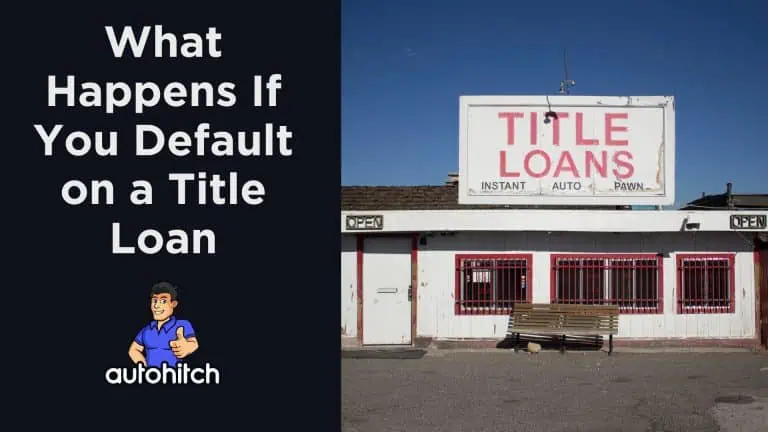Defaulting on a car title loan can lead to serious consequences like repossession of your vehicle. However, if you are worried about the worst-case scenario, going to jail is not one of them.
So, what happens if you default on a title loan?
Below, I created an article on what defaulting means when you have a title loan, precisely what can happen if you dont pay a title loan, steps to take beforehand, and options if your car gets repossessed.
Important Related Articles to Read:
- Title Loan Loopholes – How To Get Out Of A Title Loan
- Can a Title Loan Company Sue You
- Do Title Loans Affect Your Credit
Table of Contents
Key Consequences of Defaulting on a Car Title Loan
Defaulting leads to increased costs, vehicle repossession risk, and credit damage typically.
- Repossession Fees: Around $400+ in repossession, towing, storage, auction fees
- Interest Charges Continue: Interest accrues even in default until payoff
- Balance Due: Possible balance owed if auction sale doesn’t cover full defaulted amount
- Credit Reporting: Missed payments usually reported hurting your credit score
There is no question that defaulting on a title loan still carries financial and legal risks for the borrower.
Related Articles To Read:
- Can I file For Bankruptcy And Keep My Car
- How Late Can You Be On a Title Loan Before They Take Your Car?
- The Complete Guide to Car Repossession
- Title Loan Loopholes – How To Get Out Of A Title Loan
What is Defaulting on a Car Title Loan?
You default on a car title loan when you fail to make timely payments as required by the loan agreement.
Usually, the lender won’t consider you in default until you are 120+ days late on payments.
Default means you break the loan contract. Most immediate consequences are extra fees like late fees around $25-$50 and potential repossession of the vehicle used to secure the loan.
Can You Go To Jail For Not Paying a Car Title Loan?
No, you cannot go to jail or face criminal charges for defaulting on or failing to repay a car title loan.
Debtor’s prison was abolished in the 19th century. Still, some lenders illegally threaten borrowers with arrest or jail to coerce payment.
As the borrower, you have legal protections against harassment from lenders under consumer protection laws like the Fair Debt Collection Practices Act.
When Does The Lender Repossess Your Car?
If you default with no communication or attempt to remedy, the auto title lender can legally repossess your car as early as 1 month past due.
Here is the typical repossession process after default:
- The lender contracts a repossession company to pickup the vehicle. Many require a GPS device to track location.
- They tow the vehicle to a storage yard/impound lot accruing daily fees.
- Within 5 days of repossessing the car, they must mail you a written notice with auction details and steps to get it back.
- If you don’t redeem the vehicle on time, it gets auctioned off, usually within 90 days of repossession.
So act fast if you receive a repossession notice to avoid losing your vehicle permanently to auction.
How To Redeem Your Car After Repossession
Redeeming, or buying back, your repossessed vehicle involves:
- Contacting lender immediately asking for the full “reinstatement amount” or “right of redemption” amount.
- Paying entire defaulted amount, late fees, repossession costs etc. in a lump sum promptly
- Once redeemed, the repossession won’t show on your credit report typically
Through redemption, the original loan stays intact as if no default occurred as long as you pay the full amount due.
Alternatives To Defaulting on a Car Title Loan
Some options exist to avoid default or get out of debt if you anticipate missing payments:
- Refinance Loan Terms: Renegotiating duration, payment, interest rate with lender
- Loan Buyout: Another lender pays off existing title loan; you get new loan
- Debt Consolidation Loan: Combine debts into one personal loan at lower rate
- Debt Settlement: Negotiating partial lump sum payoff with lender
- Bankruptcy: Chapter 13 bankruptcy discharges/restructures debts
The essential first step is communicating concerns immediately with your lender if struggling to pay. Most should work with you to modify agreements before outright default. Getting ahead of difficulties gives more alternatives compared to post-default.
Key Takeaways
- Defaulting means you stop making title loan payments as scheduled
- Car repossession, increased costs, and credit damage are potential outcomes
- Redeeming your repossessed car involves paying the full defaulted amount promptly
- Refinancing before default lets you modify difficult payment terms more easily
- No jail time for failing to repay but protections exist against illegal harassment
Act swiftly and talk to your lender at the first sign of payment trouble. Avoid waiting until after default or repossession since options narrow significantly. Prioritize communication and actively attempting resolution to preserve your credit and transportation during financial hardship.



